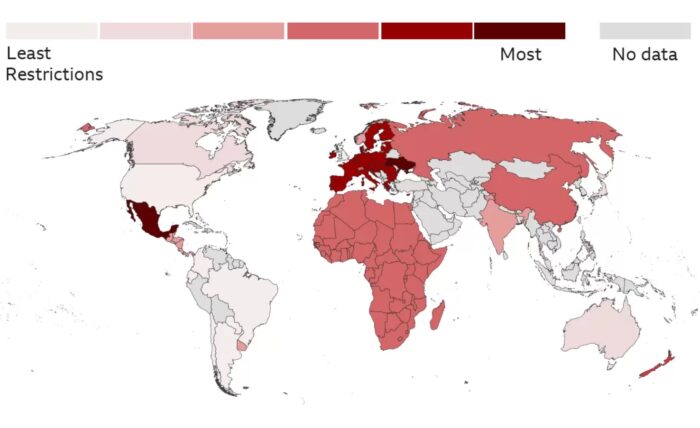Mar 24 2023
England Allows Gene-Edited Crops
 This has been somewhat of a quiet revolution, but a new law in England may bring it to the foreground. The Precision Breeding Act will now allow gene-edited plants to be developed and marketed in England (not Northern Ireland, Wales, or Scotland). The innovation is that the law makes a distinction between genetically modified organisms (GMOs) and gene-edited organisms. This has already happened in the US, with the USDA declaring that gene-editing is not the same as GMO, for regulatory purposes.
This has been somewhat of a quiet revolution, but a new law in England may bring it to the foreground. The Precision Breeding Act will now allow gene-edited plants to be developed and marketed in England (not Northern Ireland, Wales, or Scotland). The innovation is that the law makes a distinction between genetically modified organisms (GMOs) and gene-edited organisms. This has already happened in the US, with the USDA declaring that gene-editing is not the same as GMO, for regulatory purposes.
GMO has always been, in my opinion, a category that is both arbitrary and overly broad. It has referred to any organism (usually a crop) that is the result of genetic engineering using a variety of techniques. This could include silencing a gene, removing a gene, or introducing a new gene either from a related variety (cisgenic) or a distant species (transgenic). Most of the fearmongering (and that’s what it is) around GMOs have been focused on transgenic varieties, but then used to try to ban the entire category. The newer regulations, essentially, limit GMO to transgenic changes, and refer to everything else as gene-edited. This is often described as changes that could theoretically occur with breeding techniques, now just faster.
This is all good, because it restricts the damage done by anti-GMO fearmongering. It’s still wrong, it’s just not casting as wide a net. To show how arbitrary this all is, most restrictions on GMOs make exceptions for cheese made with enzymes that are the product of engineered yeast. Why? Because the cheese industry would collapse without it. Similarly, Hawaii, which is ideologically very anti-GMO, made an exception for GMO papaya. Why? You guessed it – because without it they would have lost their papaya industry.
Also, other techniques have never been part of the GMO category, such as mutation farming. What is mutation farming? Remember that Simpsons episode where Homer is running a farm and he spread radioactive material on his field to yield interesting results? That’s not far off. As Homer said, “Let’s give mother nature a little boost.” Mutation farming literally uses either chemicals or radioactivity to speed up the mutation rate of plants, to increase genetic diversity in the hopes that something useful will emerge. Mutation farming has never been part of the GMO category. Why? Do I need to say it? Hint – there are about 3200 mutagenic crop cultivars on the market today.
The anti-GMO movement has never been about safety. It has always been just a marketing strategy to boost the competition through scare tactics. The fact is, there hasn’t been any negative health consequence from GMO foods. There have not been cases of allergies or toxins getting into the food supply (the same cannot be said of traditional methods). Bioengineered cultivars are carefully regulated and studied for safety. In fact, the regulations, if anything, are unnecessarily onerous. The new “gene-edited” category is a step in the right direction. In the US the term “bioengineered” is now also used, to refer collectively to gene-edited and genetically modified (which now more restrictively refers to transgenic).
But I do hope this is just a pathway to greater acceptance of all genetic technology in crop development. There is not reason to be afraid of transgenic crops as a category, or the technology that is used to create them. The technology itself is safe. Further, each individual new cultivar should be considered by itself, regardless of the method used to create it. Even traditional breeding can and has introduced new toxins and allergens into the food chain. If anything, GMO technology is more precise and has a decreased chance of this happening, which is borne out by history.
Fear of transgenes is based in a naive understanding of biology. We share 60% of our genes with bananas. There are not tomato genes and fish genes – there are just genes. All that matters is what the gene does (what protein does it code for) and how it is regulated within the genome. If we understand the protein an its effects, it does not matter how we got it into a particular cultivar.
The bottom line is that there is no rational or scientific basis for fear of genetic technology itself or transgenes themselves. All that matters is that the technology is used responsibly, and that the products of bioengineering are reasonably tested for safety (which they are). Hopefully the newer regulations will allow crop developers to achieve most of what bioengineering technology can – something we desperately need as we have maxed our our land use, human population is growing, the environment is changing, and we are basically losing our war with pests. Citrus greening, the banana blight, and wheat fungus are just the beginning.
Unfortunately, people are easily scared by unknown possible threats into ignoring known present dangers. Risk is always a choice among options. Ignoring the potential of bioengineered crops is likely to prove far more harmful and dangerous than the theoretical and largely imagined risks of GMOs.






